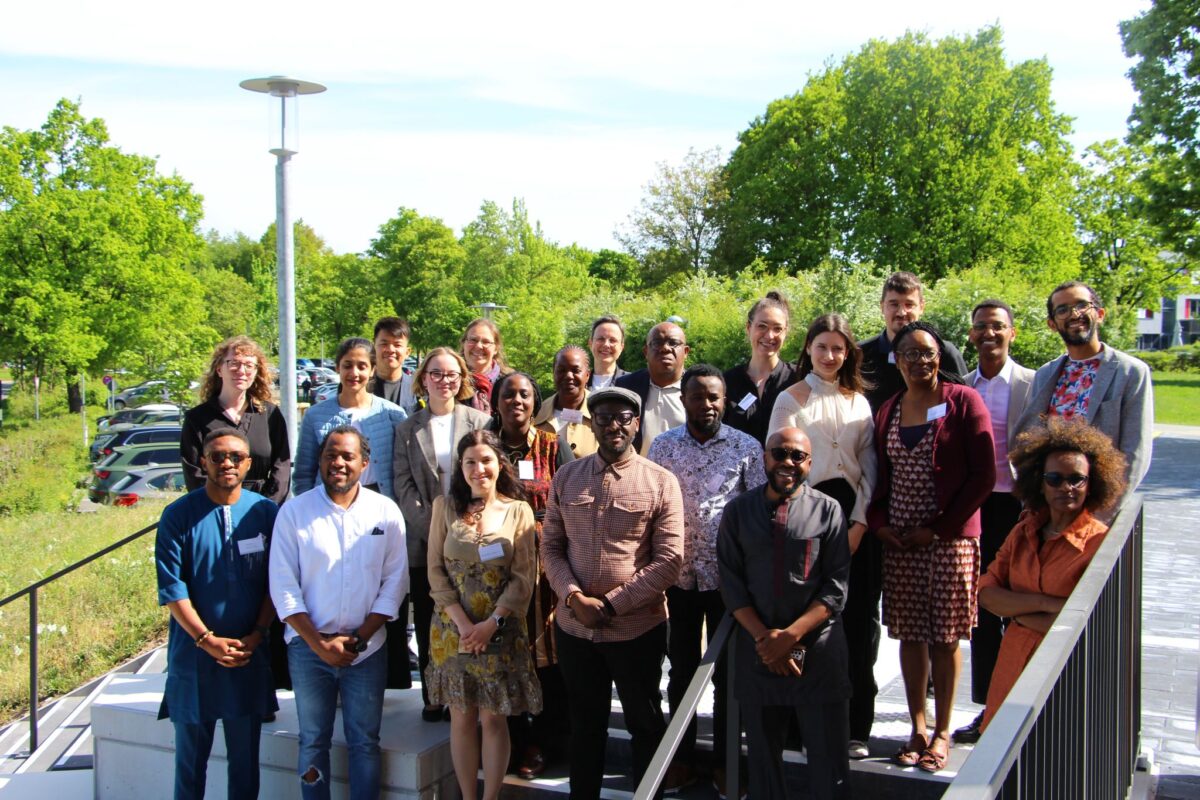Introduction
This interview was conducted by Merlin Mitschker during the “Law and Belonging” conference in Bayreuth. The conversation features Dr Godswill Agbaitoro, lecturer in International Energy and Environmental Law at the University of Essex. His work focuses on energy justice – a relatively new but increasingly relevant concept that examines fairness in the distribution of energy’s benefits and burdens, particularly in the Global South.
In this exchange, Dr Agbaitoro speaks about his path from the Niger Delta to academia, the legal and institutional challenges facing African energy systems, and why global conversations about the energy transition must address historical and structural inequities. He also shares insights into corporate responsibility, research methodology, and the opportunities for young scholars in this growing field.
Thank you for taking the time to speak with us. The blog has a diverse readership, so some people might not be as familiar with the academic legal world as you are. Please introduce yourself and explain what you do.
Thank you very much. My name is Godswill Agbaitoro. I am currently a lecturer in International Energy and Environmental Law at the University of Essex in the United Kingdom. My research primarily focuses on energy and environmental issues. I completed my PhD on energy justice, with a focus on Africa. Essentially, I looked at how the concept of energy justice, which I will explain in a bit can be applied to address various energy problems in countries of the Global South. I used Nigeria, my home country, as a case study, identifying specific injustices within the energy system that contribute to the energy crisis and access problems the country faces.
Right now, I am building on that research by exploring different interpretations of energy justice to find ways to address ongoing energy challenges.
Right now, you are in Bayreuth at the “Law and Belonging” conference. What is your relationship with the Chair of African Legal Studies, and what research interests do you share?
My connection with the Chair started as a PhD student. Prof. Kaime supervised my doctoral research at the University of Essex. During that time, we worked extensively on energy issues from an African perspective. That collaboration continued when he moved to Bayreuth to take up the Chair of African Legal Studies. Since then, we have continued exploring different areas of law and their application to African societies, often through the Chair’s office. This conference is a great opportunity to further those discussions. For this conference, my focus is on environmental justice and how it applies to African contexts.
You have talked about Energy Justice and intersections in research. Could you explain what justice means in the African context, particularly regarding normative and institutional frameworks and how they can be designed to promote justice?
Absolutely. First, a brief introduction to Energy Justice: in many African countries, even those with abundant energy resources, people still face energy access problems. This contributes to broader economic and social challenges. My research identifies injustices within the energy system that drive these access problems and then explores how the concept of energy justice can help addressing them.
In the African context, justice is closely tied to energy and the environment. Energy policies, laws, and institutions often perpetuate inequalities, which exacerbate energy crises. For example, energy companies might operate without following due processes or considering environmental impacts. Normative frameworks, such as laws and policies, need to address these root causes of injustice. Similarly, institutions must have the capacity to enforce rules and address systemic issues effectively. Strengthening both legal and institutional frameworks is crucial to delivering justice in African energy systems.
On that note, Energy Justice often focuses on operational measures. Do you think it might fail to address deeper root causes, like issues dating back to colonial-era resource extraction?
It depends on how energy justice is applied. Injustice comes in many forms – some are historical, tied to colonialism, and others are contemporary, arising from national laws or governance practices. The concept has the capacity to address both historical root causes and modern operational problems, but it needs to be applied carefully and contextually.
How should African governments approach Corporate Responsibility in the energy sector?
Law plays a critical role here. Corporate responsibility has often been voluntary, but clear, enforceable legal frameworks can ensure companies addressing energy injustices. Laws need to require companies to act responsibly in ways that mitigate environmental harm and address social inequities. Without such frameworks, corporate responsibility will stay inconsistent and ineffective.
“Growing up there, you cannot ignore the contradictions: on one hand, the wealth generated from the area; on the other, communities living without reliable energy access, facing environmental damage that affects health, livelihoods, and even basic survival.“
You have highlighted the importance of research methodology. Why is a clearly defined methodology essential, and why might combining methods be beneficial?
A clear methodology is fundamental because it allows researchers to answer their research questions systematically. During my PhD, I used a combination of normative and evaluative approaches: I analysed Nigerian energy laws and evaluated how they address injustices.Combining methods can be very effective, depending on the research. Some projects require doctrinal analysis, comparative study, and empirical evidence. The methodology must match the research questions and objectives.
Could you explain the relevance of doctrinal and evaluative research methodologies in African legal research?
Doctrinal research is the foundation of legal research. Many problems in African legal studies stem from laws that are outdated or poorly enforced, so doctrinal analysis is essential. Evaluative research, which I used in my own work, assesses how laws function in practice and whether frameworks – for example dealing with energy justice issues – are effective. Both approaches are vital for addressing African legal and energy issues.
When we talked to Dr Cyprian Kambili he emphasized the relevance of interdisciplinary research. What do you think about interdisciplinary research?
Interdisciplinary research is increasingly relevant. Combining law with science, technology, or other fields allows researchers to address complex questions more holistically. It broadens understanding and produces insights that single discipline approaches often miss.
You have spent time as a visiting researcher in the United States at the University of Houston Law Center . With recent shifts in US foreign policy, do you think there will be any implications for your research?
Not directly in terms of the subject matter, but policy changes can affect funding and opportunities for research collaborations. These changes may limit resources available for comparative studies between US and African systems, which could reduce opportunities to produce impactful research.
How did you end up pursuing academia, particularly energy and environmental law?
I am from the Niger Delta region of Nigeria, which is one of the most resource-rich parts of the country. It has vast deposits of oil and gas, but it is also a region that has suffered heavily from environmental degradation, pollution, and social unrest linked to the exploitation of those resources. Growing up there, you cannot ignore the contradictions: on one hand, the wealth generated from the area; on the other, communities living without reliable energy access, facing environmental damage that affects health, livelihoods, and even basic survival.
Those realities made me deeply interested in how laws, policies, and governance structures influence energy and environmental outcomes. I practiced law for about two years, but I realised my passion was in research and teaching. Exploring these issues in depth and finding ways to contribute to solutions. That is how I found myself in academia, and I have no regrets.
“There is an inherent injustice in telling countries that lack energy access to leap directly into clean energy.”
What advice would you give younger scholars interested in Energy Justice?
Energy justice is a relatively new field, so there is still a lot of room for research. Young scholars can explore issues like energy access inequities and systemic injustices, using the energy justice framework to propose solutions. This area is increasingly important, especially as discussions about the energy transition gain momentum.
Some argue it is unfair to discuss energy justice in Africa, given that Western countries developed using fossil fuels and now push renewable energy transitions. Do you agree?
Absolutely. There is an inherent injustice in telling countries that lack energy access to leap directly into clean energy. Fundamental access issues must be addressed first. Historical per-capita emissions from developed countries also highlight this unfairness. Energy justice in the context of the global energy transition is crucial to ensure equitable development.
Is the concept of energy justice new, or has it been around for decades?
The issues have existed for a long time, but the specific interpretation of energy justice is quite recent. Environmental injustices were recognized earlier, but energy access inequities were not widely conceptualized until the last decade.
Thank you so much for sharing your insights.
Thank you very much. It has been a pleasure.


